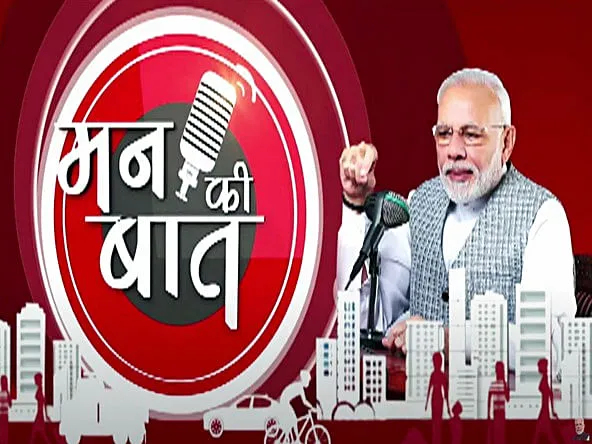Srinagar, Apr 28: As ‘Mann Ki Baat’ is all set to complete 100 episode on Sunday, there were several instance when Prime Minister Narendra Modi talked about Jammu and Kashmir.
The ‘Mann Ki Baat’ radio programme is held every month’s last Sunday, through which the PM Modi interacts with the nation.
Its first show aired on October 3, 2014. The ruling Bharatiya Janata Party (BJP) is making special arrangements for the 100th episode of ‘Mann Ki Baat’, which would be aired on April 30.
In homes and in roadside restaurants, people listen to what each episode is about. The consistent message of his broadcasts is that citizens of India are special people, and need to have the confidence to act in a manner that assists in pushing forward the trajectory of the country.
A recent survey has shown that more than 100 crore people have listened to Prime Minister Narendra Modi’s ‘Mann Ki Baat’ at least once while 23 crore people are regular listeners of the monthly radio broadcast.
According to the survey, the most liked characteristics of the ‘Mann Ki Baat’ are that the leader is knowledgeable, creates an emotional connect with the audience, is powerful and decisive, has sympathetic and empathetic approach, and directly talks to the citizens and guides them.
J&K IN ‘MANN KI BAAT’
Back to Village
In July last year, PM Modi said that people of J&K prefer development over bombs and cited the Community Mobilisation Programme ‘Back to Village’ (B2V) held in June in J&K.
The PM said that those trying to spread hate and obstruct development works in Kashmir would never succeed. He said that the ‘B2V’ programme saw enthusiastic participation of the villagers everywhere, including in very sensitive and remote villages, as government officials reached there to discuss development schemes with the locals.
PM Modi said, “When I came to know about the programme from Muhammad Aslam of Shopian and found out the details, I realised that people of J&K want good governance and prefer development over bombs.”
He said that for the first time had the senior officials reached the doorsteps of villagers across 4500 panchayats.“These officials also reached villages on the border where people live under the shadow of cross-border firing,” the PM said. “Without any fear they also visited sensitive villages in the districts of Shopian, Pulwama, Kulgam, and Anantnag – the districts which have seen heightened terror activity of late.”
Nadru
During another ‘Mann Ki Baat’ episode, the PM said that the demand for lotus stem known as ‘Nadru’ in Kashmir language had increased following which farmers cultivating Nadru in Dal Lake had formed a Farmer Producer Organisation (FPO).
“About 250 farmers have joined this FPO, and around 2500 farmers are cultivating lavender in Bhaderwah town in Doda district,” he said.
The PM said that people of Kashmir related to agriculture were diffusing the fragrance of its success. “Farmers had been engaged in traditional maize cultivation for decades, but some farmers thought of doing something different. They turned to floriculture. Today, around 2500 farmers are cultivating lavender here. They have also been handheld through the central government’s Aroma Mission. This new cultivation has greatly increased the income of the farmers,” he said.
Pencil village
In the 70th edition of ‘Mann Ki Baat’, PM Modi said that Pulwama was making the country self-reliant in the field of pencil making.
“Today, Pulwama is playing an important role in educating the entire country. Today, when children all over the nation do their homework, or prepare notes, somewhere behind this is the hard work of the people of Pulwama. Kashmir meets almost 90 percent demand for pencil slats, timber casings of the entire country, and of that, a large share comes from Pulwama,” he said. “Once upon a time, we used to import wood for pencils from abroad, but, now Pulwama is making the country self-sufficient in the field of pencil making. In fact, the pencil slats of Pulwama are reducing the gaps between states! Chinar wood of Kashmir has high moisture content and softness, which makes it most suitable for the manufacture of pencils.”
Saffron
In another episode of ‘Mann Ki Baat’, PM Modi encouraged people in the country to buy and promote Kashmir saffron to make it a popular global brand.
Urging people to substitute foreign-made products with those produced in India, he said that the Geographical Indication (GI) tag to Kashmir saffron had given it a unique identity in the world.
“The quality of Kashmiri saffron is very unique. It is entirely different from the saffron found in other countries. We want Kashmiri saffron to be a popular global brand,” the PM said. “So, the next time you want to buy ‘Kesar’ (saffron), do try Kashmiri saffron.”
He said that Kashmiri saffron represents the cultural heritage of J&K.“Kashmiri saffron also has a variety of medicinal properties. It is very fragrant, and the colour is thick,” PM Modi said.
Beekeeping
In yet another episode of ‘Mann Ki Baat’ he said, “Vinod Kumar is beekeeping in more than 1500 colonies in Palli village of Jammu. He trained in rearing the queen bee last year.”
The PM said that Kumar had been earning Rs 15 lakh to Rs 20 lakh annually.“Every time in ‘Mann Ki Baat’ we discuss successes of the countrymen who bring smiles to our faces. If a success story spread sweet smiles, and also tastes sweet, you will certainly call it icing on the cake. These days our farmers are performing similar wonders in the production of honey. The sweetness of honey is also changing lives of our farmers and increasing their income,” he said.







